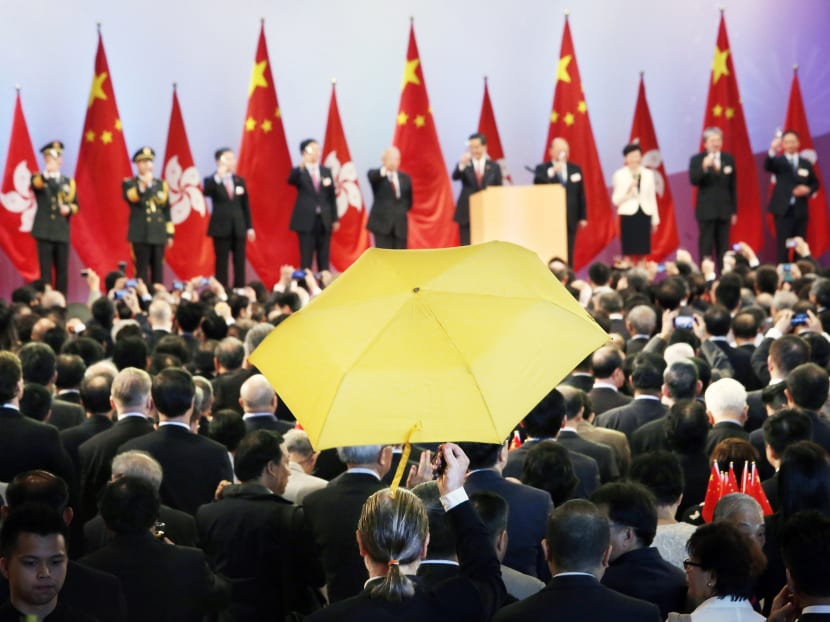HK leader opts to wait out protesters as numbers grow
HONG KONG — Crowds of pro-democracy protesters in Hong Kong swelled yesterday on a holiday marking China’s National Day, but with the support of Chinese leaders, Hong Kong’s chief executive and his inner core of advisers have decided that their best strategy is to wait and hope that the disruption of everyday life will turn local public opinion against the demonstrators.

Mr Paul Zimmerman, a district councillor, raising a yellow umbrella during a flag-raising ceremony celebrating China’s 65th National Day. Photo: REUTERS
HONG KONG — Crowds of pro-democracy protesters in Hong Kong swelled yesterday on a holiday marking China’s National Day, but with the support of Chinese leaders, Hong Kong’s chief executive and his inner core of advisers have decided that their best strategy is to wait and hope that the disruption of everyday life will turn local public opinion against the demonstrators.
Mr Leung Chun-ying and his advisers have decided not to use force to disperse the demonstrations, but also not to hold formal negotiations with protest leaders for now, said people with detailed knowledge of the Hong Kong government’s and Beijing’s policies. Nor has there been any serious discussion of Mr Leung’s resigning, as the protesters, who number in the tens of thousands and have blocked three major thoroughfares for days, are demanding.
As night fell yesterday, the streets of downtown Hong Kong filled with what appeared to be the biggest crowd since the protests began last Friday. Mostly teenagers and adults in their 20s, they were in a festive mood, many taking pictures of one another.
The city’s leadership has concluded that it would be pointless for Mr Leung to sit down with protest leaders, although a few informal contacts have been made with democracy advocates. Beijing has given the Hong Kong government only a little room to negotiate the details of how the next Chief Executive will be elected in 2017 — the fundamental issue for the demonstrators.
“The government can tolerate the blockade of three or four or five areas and see how the demonstrations go, so the only way the demonstrators can go is to escalate it — spread it to more places and then they cannot sustain it — or they will become violent,” said a person who is deeply involved in the Hong Kong government’s decision-making. If the demonstrators do become violent, “they know better than we do that they will lose support overnight”, added the person, who insisted on anonymity because he was not authorised to speak with journalists.
An adviser to the government also said that officials’ emerging view was that Mr Leung should bide his time.
“The consensus is to wait and patiently deal with the crisis — it is not easy, but we shall do our best to resolve it peacefully,” the adviser said.
The strategy carries risks, for both Hong Kong and Beijing, because it in effect cedes momentum to the protesters and allows them to drive events going forward. For China, continuing protests could inspire more dissent on the mainland, despite its censors’ attempts to block discussion of the events. Chinese Human Rights Defenders, an advocacy group, said yesterday that China had already detained or intimidated dozens of people for perceived transgressions, such as expressing support for the protesters on social media.
For the Hong Kong government, the risk is that the city’s image as a stable financial centre will be harmed and that the government’s intransigence, rather than the protesters’ actions, will be blamed for the short-term economic disruption.
The leaders of the demonstrators have repeatedly insisted that they will only pursue non-violent civil disobedience.
The government adviser said officials were actively trying to avoid a Tiananmen-style crackdown.
“We cannot repeat the mistake of 25 years ago,” the adviser said.
One crucial question is how much patience Beijing has. There was a hint of impatience in an editorial yesterday in People’s Daily, the main Communist Party newspaper, which attacked the protests as being confrontational.
“And now, a handful of people are bent on confronting the law and stirring up trouble. (They) will eventually suffer the consequences of their actions,” it said. AGENCIES






